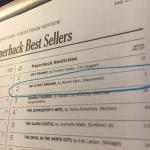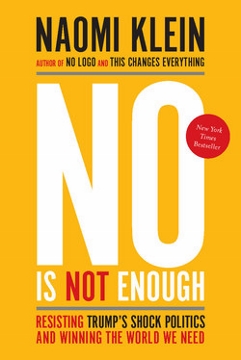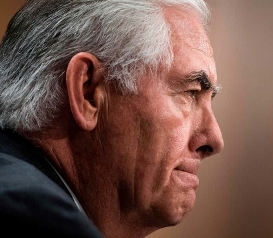Naomi Klein on Trump: The Master of Disaster


Lately the pace of news has felt so fast and its volume so overwhelming that the very idea of a political book seems quaint, a relic of the gentler and more carefree time before we were all pinned to the floor by the social media firehose. Naomi Klein has written No Is Not Enough at near internet speed, a warning of the enormous toxic potential of the Donald Trump presidency and a call to oppose it. As the title suggests, Klein wants her readers to move from refusal to resistance, from a passive stance of opposition to engagement in a programme of action. If the convulsions of the last year have taught us anything, it’s that we can’t wait for the dust to settle and clarity to emerge. Turbulence is, at least for the foreseeable future, our new condition, and we must learn to function within it. We have to teach ourselves to stand upright on a moving deck.
Klein emerged as a star of the 1990s social movements that were trying to frame a politics of opposition to capitalist globalisation. Was exchange value the only kind of value? What about the environmental, social and cultural formations that were being reorganised (and in some cases damaged or destroyed) by the logic of the market? Klein’s widely-read 2000 book No Logo packaged and synthesised ideas that had been circulating in anti-capitalist circles during the previous decade, helping a general readership to understand changes taking place in corporations, which had begun to outsource many of their functions and view themselves primarily as “brands”, deployers of intellectual property that did not need, for example, to do their own manufacturing or distribution. It was, as she puts it in No Is Not Enough, “a race toward weightlessness; whoever owned the least, had the fewest employees on the payroll and produced the most powerful images as opposed to things, won the race”.
Klein points out that Trump’s business has followed that trajectory. As a property developer, the future president was (by Manhattan standards) only moderately successful, his primary distinction being an above average appetite for seeing himself in the media. His innovation, helped by his position as host of The Apprentice, was to brand high-end real estate – not just hotels and resorts, but office towers, apartment buildings and golf courses. Klein dissects the values of the Trump brand, noting that it doesn’t stand for quality or innovation or taste, but for “richness” itself, associating the consumer with wealth in its most direct and uninflected form.
In Trumpworld there are only two existential categories: winners and losers. Trump stands for winning, and if you oppose him, you are a loser. His support is curiously immune to scandals and failings that would have sunk other politicians, a curious fact that Klein ascribes to the migration of branding into politics. Trump has shown that “you don’t need to be objectively good or decent; you only need to be true and consistent to the brand you have created”. Trump’s brand is that he’s the boss and part of being the boss is that the rules don’t apply to him. One strategy for opposing him is to attack the brand. It’s why, for example, a red line for interviewers has always been any suggestion that his fortune is not as large as he claims.

The most consequential part of Klein’s analysis stems from personal experience. The social movements were gaining traction when 9/11 happened. “The era of the so-called War on Terror pretty much wiped our movement off the map in North America and Europe,” she writes. Intimidated (or seduced) by the rhetoric of the “clash of civilisations” and the harsh new security environment, many participants withdrew their support. “Antiglobalisation is so yesterday,” ran a headline in Canada’s National Post, a few days after the attacks. The shock of 9/11 was exploited by various actors to inaugurate a “security bubble”, in which police and security powers were extended and vast resources were diverted from other uses to fight the war on terror. In The Shock Doctrine (2007), Klein argued that there is a playbook for exploiting shock events such as 9/11 and the Iraq war. As she puts it in No Is Not Enough: “Wait for a crisis (or even, in some instances, as in Chile or Russia, help foment one), declare a moment of what is sometimes called ‘extraordinary politics’, suspend some or all democratic norms – and then ram the corporate wish list through as quickly as possible.”
This wish list may include the seizure of land and resources, increased military spending, privatisation of public goods and economic deregulation. The “shock doctrine” doesn’t require the machinery of conspiracy to function. It is a collection of political techniques and impulses, the dark underside of the Austrian economist Joseph Schumpeter’s idea of “creative destruction” and the Silicon Valley injunction to “move fast and break things”. The result is “the decimation of the public sphere and the public interest”, and the tendency to move wealth rapidly upwards into the hands of a tiny minority.
Klein notes that Trump’s cabinet is packed with “masters of disaster”, men whose careers have been based on exploiting shock. Secretary of state Rex Tillerson’s Exxon profited handsomely from the spike in the oil price after the 2003 invasion of Iraq and has done more or less everything in its power to ensure global inaction on climate change. Treasury secretary Steven Mnuchin is known as “the foreclosure king”. Vice-president Mike Pence played a particularly ignominious role in the aftermath of Katrina when, as chair of a group of conservative lawmakers called the Republican study committee, he promoted a slate of what Klein terms “pseudo relief policies”, including reduction of labour standards, “making the entire affected area a flat-tax free-enterprise zone” and (staggeringly) repealing environmental regulations along the Gulf Coast.
Trump’s unselfconscious reaction to 9/11 was to see it as a marketing opportunity, remarking to a journalist that he now had the tallest building in Manhattan. Intentionally or not, he has shown himself adept at creating instability, not least in his own workplace, and the fear, as Klein underscores, is that he will be tempted to deliver the ultimate shock in the form of another war. Then, perhaps, he will be able to test out his armchair quarterback opinion about Iraq, that America “should have taken the oil”. Go to war, take the oil. It’s a foreign policy of a sort.

If you spend your days glued to your phone and have 30 political tabs open on your browser, much of the material in No Is Not Enough will be familiar. The book’s chief value lies in synthesis. Klein’s particular background and expertise allow her to pull together the disparate threads of what it would be misleading to call “Trumpism”, if only because of the unwarranted suggestion of system and control. How you view her political proposals will depend on your politics, particularly on the value one ascribes to what used to be called “the extraparliamentary left”. She insists, rightly in my view, that there is a need to promote a positive alternative social vision, and that ostensibly “utopian” aims and proposals are a way to avoid being caught in a politics that is merely reactive or timidly reformist. Partly, I think, because she believes (again, I’d argue correctly) that a lightly greenwashed version of the status quo will never save us from the catastrophic consequences of climate change, Klein skims over the terrain of legislative politics. She has little practical advice for people engaged in the sort of dull, incremental political action – lobbying, attempting to influence legislation – that is aimed at turning the oil tanker that is the US Congress. Nor does she advocate particular aims or tactics for organisers. The book ends with a document called The Leap Manifesto, drawn up by Canadian activists in 2015, a “platform without a party”, which is a powerful statement of alternative principles that feels as though it needs a thread to connect it to today’s largely defensive struggles.
Leaving aside the thorny issue of electoral subversion, it is notable that Russia provides a possible model for the Trump administration. Its rulers are men who profited from the cataclysmic shock of the end of communism, reaping fortunes in the violent, turbulent 1990s. The order they have imposed has brought about the near destruction of politics as a public activity. This is not an easily reversible condition, and its spread to the US would be a catastrophe. The supreme court has, in its wisdom, decided that corporations are people and money is speech, and free speech cannot be limited. In an environment where the amount of money in politics is truly staggering, the only safeguard left to the public is rigorous transparency. If public scrutiny is ended, Trump and his “masters of disaster” may also be able to put an end to ordinary people’s ability to shape the forces governing their lives. Klein’s book is ultimately optimistic, because she believes the power to make change lies in the popular will. She calls on us to recognise that this will has enemies, and they are making havoc.
[Reviewer HARI KUNZRU is the author of White Tears (2017) and four previous novels. His work has been translated into 21 languages, and his short stories and journalism have appeared in many publications, including The New York Times, The Guardian, and The New Yorker.]
